人教版七年级上册易混介词in on at用法总结及练习
- 格式:doc
- 大小:33.50 KB
- 文档页数:3
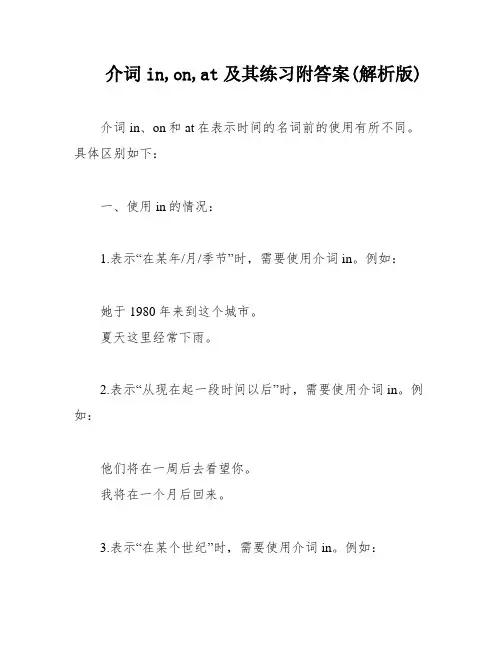
介词in,on,at及其练习附答案(解析版)介词in、on和at在表示时间的名词前的使用有所不同。
具体区别如下:一、使用in的情况:1.表示“在某年/月/季节”时,需要使用介词in。
例如:她于1980年来到这个城市。
夏天这里经常下雨。
2.表示“从现在起一段时间以后”时,需要使用介词in。
例如:他们将在一周后去看望你。
我将在一个月后回来。
3.表示“在某个世纪”时,需要使用介词in。
例如:这台机器是在18世纪发明的。
20世纪发生了巨大变化。
4.表示“在某个年代或特定世纪某个年代”时,需要使用介词in。
例如:该事件发生在20世纪70年代。
抗日战争爆发于20世纪30年代。
5.除此之外,morning、evening和afternoon三个词也常与介词in连用。
例如:晚上看电视不要太多。
他们有时在下午做游戏。
二、使用on的情况:1.表示“在具体的某一天”或“(在具体的某一天的)早上、中午、晚上”等,需要使用介词on。
例如:杰克生于1982年5月10日。
他们是在一个雨天的早上离开的。
他于一个夏天的下午返回了美国。
2) 表示星期几或其时间,需使用介词on。
例如:我们星期六和星期天不上学。
平日你几点起床?我是在星期六的早晨听到这个故事的。
3) 表示某个节日,需使用介词on。
例如:我们通常在中秋节吃月饼。
胡老师在教师节那天收到了一张卡片。
1) 表示具体时间点,需使用介词at。
例如:他每天六点起床。
昨天下午五点半我到家了。
2) 表示特定的时节或时机,需使用介词at。
例如:他们那时很幸福。
我认为商店在白天的这个时候关门了。
3) 表示中午、夜晚或周末,需使用介词at。
例如:你中午经常做些什么?夜晚你能看到天空中有许多星星。
4) 表示某个年龄,需使用介词at。
例如:这个男孩在九岁的时候就游泳游得很好了。
When I was twenty years old。
I started teaching English at a school。
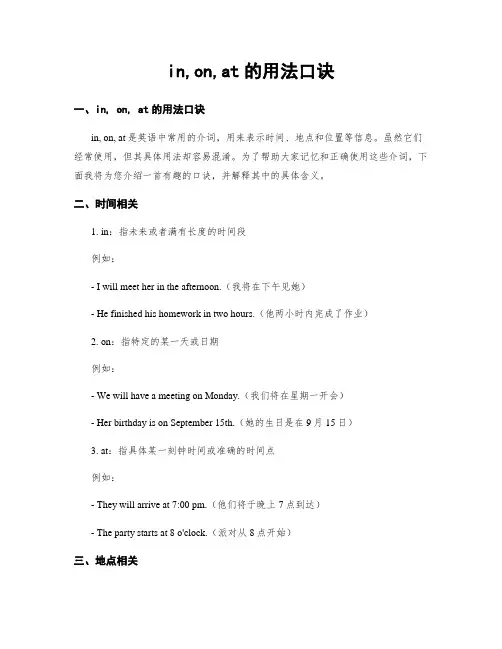
in,on,at的用法口诀一、in, on, at的用法口诀in, on, at是英语中常用的介词,用来表示时间、地点和位置等信息。
虽然它们经常使用,但其具体用法却容易混淆。
为了帮助大家记忆和正确使用这些介词,下面我将为您介绍一首有趣的口诀,并解释其中的具体含义。
二、时间相关1. in:指未来或者满有长度的时间段例如:- I will meet her in the afternoon.(我将在下午见她)- He finished his homework in two hours.(他两小时内完成了作业)2. on:指特定的某一天或日期例如:- We will have a meeting on Monday.(我们将在星期一开会)- Her birthday is on September 15th.(她的生日是在9月15日)3. at:指具体某一刻钟时间或准确的时间点例如:- They will arrive at 7:00 pm.(他们将于晚上7点到达)- The party starts at 8 o'clock.(派对从8点开始)三、地点相关1. in:指大范围区域或封闭空间内部例如:- She lives in California.(她住在加州)- We had dinner in a restaurant last night. (昨晚我们在一家餐馆里吃晚饭)2. on:指在某个平面或具体位置的表面上例如:- There is a book on the table.(桌子上有本书)- The picture hangs on the wall.(这幅画挂在墙上)3. at:指一个特定的地点或场所例如:- Let's meet at the park after school.(放学后我们在公园见面吧)- He works at a hospital.(他在一家医院工作)四、位置相关1. in:指封闭空间内部例如:- The cat is in the box.(猫在盒子里)- She is in her office now.(她现在在办公室)2. on:指物体的表面例如:- The book is on the table. (书在桌子上)- There is a plate on the shelf.(架子上有个盘子)3. at:用于特定的位置或方位例如:- The car is parked at the curb.(车停在路边)- They are standing at the entrance of the building.(他们站在大楼入口处)五、总结使用in, on, at时,需要根据不同的语境和含义进行选择。
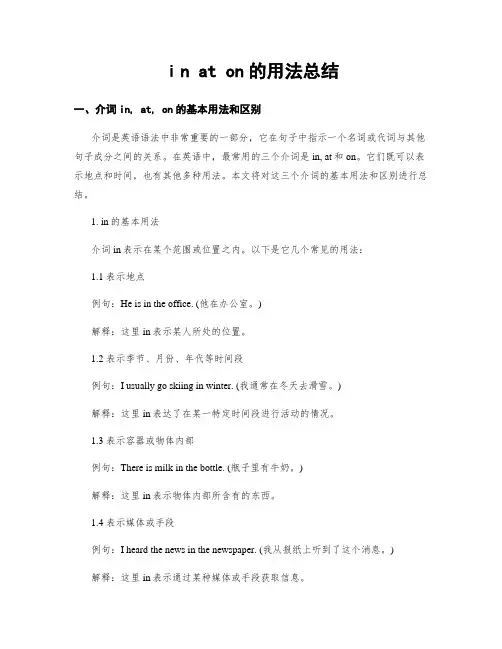
ⅰn at on的用法总结一、介词in, at, on的基本用法和区别介词是英语语法中非常重要的一部分,它在句子中指示一个名词或代词与其他句子成分之间的关系。
在英语中,最常用的三个介词是in, at和on。
它们既可以表示地点和时间,也有其他多种用法。
本文将对这三个介词的基本用法和区别进行总结。
1. in的基本用法介词in表示在某个范围或位置之内。
以下是它几个常见的用法:1.1 表示地点例句:He is in the office. (他在办公室。
)解释:这里in表示某人所处的位置。
1.2 表示季节、月份、年代等时间段例句:I usually go skiing in winter. (我通常在冬天去滑雪。
)解释:这里in表达了在某一特定时间段进行活动的情况。
1.3 表示容器或物体内部例句:There is milk in the bottle. (瓶子里有牛奶。
)解释:这里in表示物体内部所含有的东西。
1.4 表示媒体或手段例句:I heard the news in the newspaper. (我从报纸上听到了这个消息。
)解释:这里in表示通过某种媒体或手段获取信息。
2. at的基本用法介词at表示在特定的位置、时间或事件中。
以下是它几个常见的用法:2.1 表示地点例句:She is waiting for you at the station. (她在车站等你。
)解释:这里at表示某人所处的具体地点。
2.2 表示具体时间点例句:The meeting will start at 9:00 am. (会议将于上午9点开始。
)解释:这里at表示某一特定时间点。
2.3 表示活动例句:They laughed at the joke. (他们笑了起来,因为那个笑话太搞笑了。
)解释:这里at表示活动发生时的情况。
2.4 表示事件或状态例句:He was surprised at the news. (他对这个消息感到惊讶。
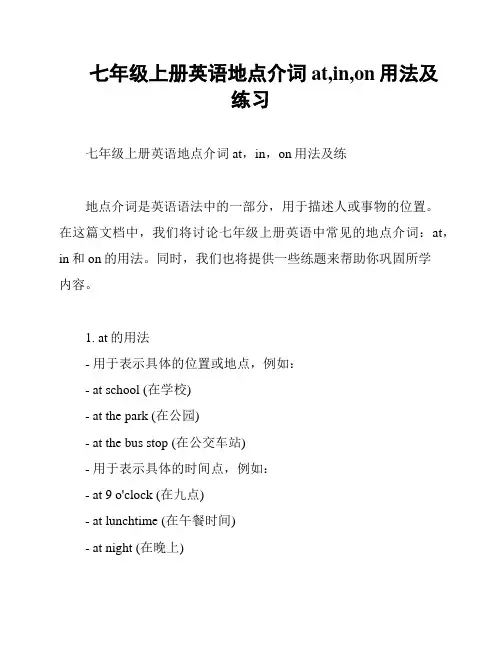
七年级上册英语地点介词at,in,on用法及练习七年级上册英语地点介词at,in,on用法及练地点介词是英语语法中的一部分,用于描述人或事物的位置。
在这篇文档中,我们将讨论七年级上册英语中常见的地点介词:at,in和on的用法。
同时,我们也将提供一些练题来帮助你巩固所学内容。
1. at的用法- 用于表示具体的位置或地点,例如:- at school (在学校)- at the park (在公园)- at the bus stop (在公交车站)- 用于表示具体的时间点,例如:- at 9 o'clock (在九点)- at lunchtime (在午餐时间)- at night (在晚上)2. in的用法- 用于表示大的地点范围,例如:- in Beijing (在北京)- in the park (在公园)- in the classroom (在教室)- 用于表示季节、月份、年代等时间段,例如:- in summer (在夏季)- in October (在十月)- in the 1990s (在上世纪九十年代)3. on的用法- 用于表示具体的表面或平面,例如:- on the desk (在桌子上)- on the wall (在墙上)- on the floor (在地板上)- 用于表示具体的日期或星期几,例如:- on Monday (在星期一)- on June 1st (在六月一日)- on New Year's Day (在元旦)练题:填入适当的地点介词(at, in, on)来完成下列句子:1. I will meet you ___ the library.2. The cat is ___ the table.3. We have a class ___ 9 o'clock.4. They are playing soccer ___ the park.5. The party is ___ Friday night.答案:1. at2. on3. at4. in5. on希望本文对你理解七年级上册英语地点介词的用法有所帮助。
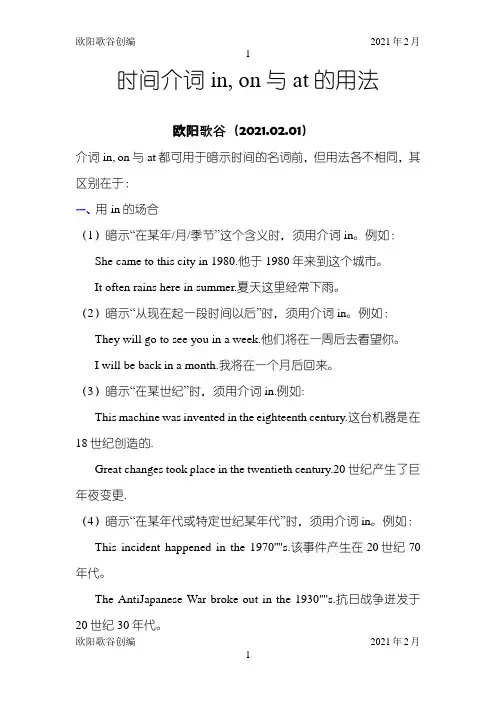
时间介词in, on与at的用法欧阳歌谷(2021.02.01)介词in, on与at都可用于暗示时间的名词前,但用法各不相同,其区别在于:一、用in的场合(1)暗示“在某年/月/季节”这个含义时,须用介词in。
例如:She came to this city in 1980.他于1980年来到这个城市。
It often rains here in summer.夏天这里经常下雨。
(2)暗示“从现在起一段时间以后”时,须用介词in。
例如:They will go to see you in a week.他们将在一周后去看望你。
I will be back in a month.我将在一个月后回来。
(3)暗示“在某世纪”时,须用介词in.例如:This machine was invented in the eighteenth century.这台机器是在18世纪创造的.Great changes took place in the twentieth century.20世纪产生了巨年夜变更.(4)暗示“在某年代或特定世纪某年代”时,须用介词in。
例如:This incident happened in the 1970''''s.该事件产生在20世纪70年代。
The AntiJapanese War broke out in the 1930''''s.抗日战争迸发于20世纪30年代。
(5)除此之外,morning / evening / afternoon 三个词也常跟介词in 连用。
例如:Don't watch TV too much in the evening.晚上看电视不要太多。
They sometimes play games in the afternoon.他们有时在下午做游戏。
二、用on的场合(1)暗示“在具体的某一天”或“(在具体的某一天的)早上、中午、晚上”等,须用介词on。
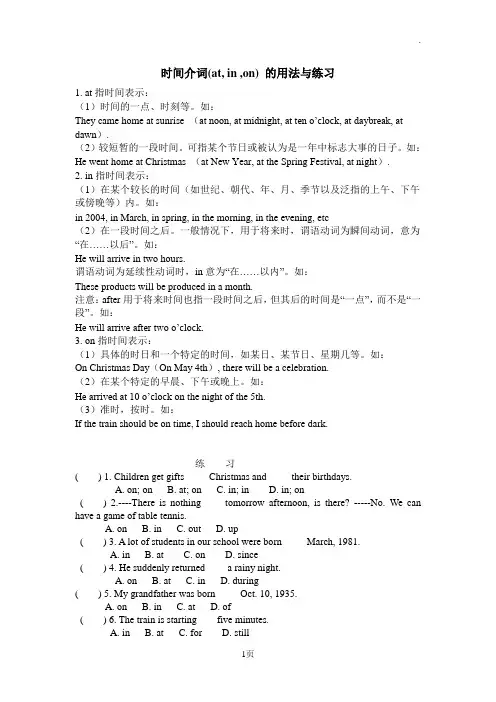
时间介词(at, in ,on) 的用法与练习1. at指时间表示:(1)时间的一点、时刻等。
如:They came home at sunrise (at noon, at midnight, at ten o’clock, at daybreak, at dawn).(2)较短暂的一段时间。
可指某个节日或被认为是一年中标志大事的日子。
如:He went home at Christmas (at New Year, at the Spring Festival, at night).2. in指时间表示:(1)在某个较长的时间(如世纪、朝代、年、月、季节以及泛指的上午、下午或傍晚等)内。
如:in 2004, in March, in spring, in the morning, in the evening, etc(2)在一段时间之后。
一般情况下,用于将来时,谓语动词为瞬间动词,意为“在……以后”。
如:He will arrive in two hours.谓语动词为延续性动词时,in意为“在……以内”。
如:These products will be produced in a month.注意:after用于将来时间也指一段时间之后,但其后的时间是“一点”,而不是“一段”。
如:He will arrive after two o’clock.3. on指时间表示:(1)具体的时日和一个特定的时间,如某日、某节日、星期几等。
如:On Christmas Day(On May 4th), there will be a celebration.(2)在某个特定的早晨、下午或晚上。
如:He arrived at 10 o’clock on the night of the 5th.(3)准时,按时。
如:If the train should be on time, I should reach home before dark.练习( ) 1. Children get gifts ____ Christmas and ____ their birthdays.A. on; onB. at; onC. in; inD. in; on( ) 2.----There is nothing ____tomorrow afternoon, is there? -----No. We can have a game of table tennis.A. onB. inC. outD. up( ) 3. A lot of students in our school were born ____ March, 1981.A. inB. atC. onD. since( ) 4. He suddenly returned____ a rainy night.A. onB. atC. inD. during( ) 5. My grandfather was born ____ Oct. 10, 1935.A. onB. inC. atD. of( ) 6. The train is starting ___ five minutes.A. inB. atC. forD. still( ) 7. Mike does his exercises ____ seven _____ the evening.A. on; toB. at; inC. by; ofD. at; on( ) 8. Children wake up very early ____ the morning of Christmas Day.A. inB. onC. forD. at( ) 9 ____ a cold winter morning, I met her in the street.A. InB. OnC. AtD. For( ) 10 It happened to be very cold____ the morning of our sports meeting.A. atB. onC. withD. of( ) 11. Why did you get up so early ___ this morning.A. onB. /C. atD. in( ) 12. He went to Shanghai___ September 3, 1991 and came back___ a cold morning last year.A. in; onB. on; inC. on; onD. in; in( ) 13. Lucy was born____ the night of May 12, 1984. . ...A. onB. inC. atD. to( ) 14. Mrs Brown came to China ____ 1996.A.onB. ofC. to,D. in( ) 15 ___ the morning of November 20, 1915, the workers came to Chicago to show their mourning of Joe Hill.A. OnB. InC. OnD. At( ) 16. Ann moved ___ Hangzhou ___ September, 1992.A. /; inB. to; inC. to; on D, in; in( ) 17. They started off ___ an autumn afternoon.A. duringB. atC. inD. on( ) 18. He often goes ____ school ____ six thirty ____ the morning.A. for; to; inB. to; at; inC. to; for; at D, for; at; to( ) 19. He arrived ___ Shanghai ___ 9: 30 ___ March 5.A. at; in; atB. to; on; atC. in; on; atD. in; at; on( ) 20.The English teacher told me to get there____ half past ten.A: in B. at C. on D. of答案:B A A A A A B B B B BC AD B A D B D B。
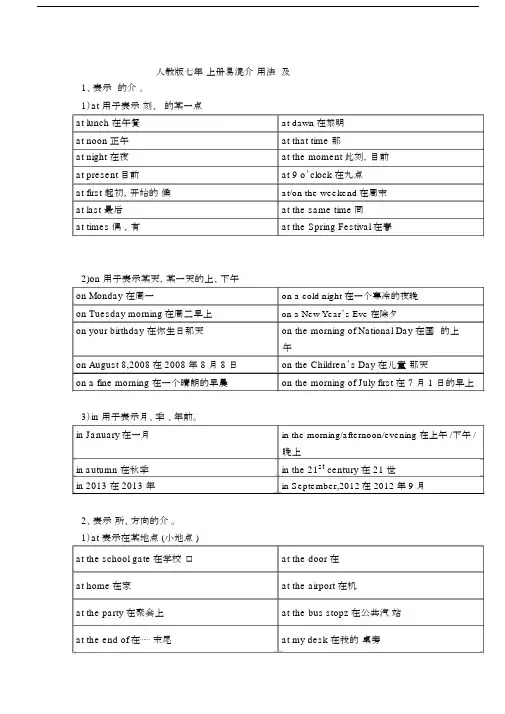
人教版七年上册易混介用法及1、表示的介。
1)at 用于表示刻、的某一点at lunch 在午餐at dawn 在黎明at noon正午at that time 那at night 在夜at the moment此刻,目前at present目前at 9 o’clock 在九点at first 起初,开始的候at/on the weekend在周末at last 最后at the same time同at times 偶,有at the Spring Festival在春2)on 用于表示某天,某一天的上、下午on Monday 在周一on a cold night 在一个寒冷的夜晚on Tuesday morning在周二早上on a New Year’s Eve 在除夕on your birthday 在你生日那天on the morning of National Day 在国的上午on August 8,2008在 2008 年 8 月 8 日on the Children’s Day 在儿童那天on a fine morning 在一个晴朗的早晨on the morning of July first 在 7 月 1 日的早上3)in 用于表示月、季、年前。
in January在一月in the morning/afternoon/evening 在上午 /下午 /晚上in autumn 在秋季in the 21st century 在 21 世in 2013 在 2013 年in September,2012在 2012 年 9 月2、表示所、方向的介。
1)at 表示在某地点 (小地点 )at the school gate在学校口at the door 在at home在家at the airport 在机at the party 在聚会上at the bus stopz在公共汽站at the end of在⋯⋯末尾at my desk 在我的桌旁2)in 表示在某地(大地点);可表示在⋯⋯里。
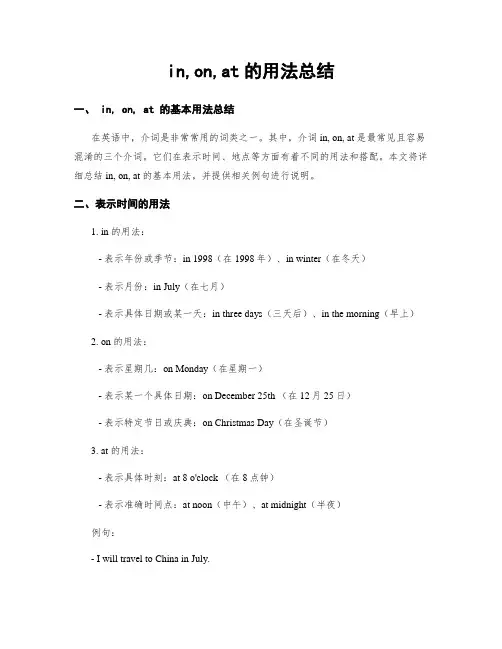
in,on,at的用法总结一、 in, on, at 的基本用法总结在英语中,介词是非常常用的词类之一。
其中,介词 in, on, at 是最常见且容易混淆的三个介词。
它们在表示时间、地点等方面有着不同的用法和搭配。
本文将详细总结 in, on, at 的基本用法,并提供相关例句进行说明。
二、表示时间的用法1. in 的用法:- 表示年份或季节:in 1998(在1998年)、in winter(在冬天)- 表示月份:in July(在七月)- 表示具体日期或某一天:in three days(三天后)、in the morning(早上)2. on 的用法:- 表示星期几:on Monday(在星期一)- 表示某一个具体日期:on December 25th (在12月25日)- 表示特定节日或庆典:on Christmas Day(在圣诞节)3. at 的用法:- 表示具体时刻:at 8 o'clock (在8点钟)- 表示准确时间点:at noon(中午)、at midnight(半夜)例句:- I will travel to China in July.- She has an important meeting at 9 a.m.- We usually have dinner together on Sundays.三、表示地点的用法1. in 的用法:- 表示一个较大的地区或国家:in China(在中国)、in the city(在城市) - 表示具体位置或建筑物内部:in the park(在公园内)、in the room(在房间里)2. on 的用法:- 表示某个平面上的位置:on the table (在桌子上)- 表示交通工具上的位置:on the bus(在公交车上)3. at 的用法:- 表示地址、具体门牌号等:at 123 Main Street (在Main街123号)- 表示特定场所:at the cinema(在电影院)例句:- She is waiting for you in the park.- The book is on the table.- The concert will be held at the stadium.四、表达习惯和规则的用法1. in 的用法:- 和月份连用,表示某一段时间内:in June (在六月份)- 表示一般情况或范围之内:in general(一般而言)2. on 的用法:- 和日期连用,表示特定日期上发生的事件:on Monday morning (在星期一早上)- 和特定日子连用,表示纪念日或重要事件:on New Year's Day(元旦节)、on Christmas Eve(平安夜)3. at 的用法:- 和具体时刻连用,表示某个具体时间点:at midnight (在午夜)- 和节日连用,表示参与活动的特定日期:at Easter(在复活节)例句:- He always goes to bed at midnight.- In June, I will have a vacation.- We usually have a party on New Year's Day.综上所述,介词 in, on, at 在表示时间、地点和习惯规则等方面有着不同的用法。

Unit 7 语法总结: 介词总结介词是表达词语之间语义关系的词类,常见介词包括:in, on, at, under, with, for, of, about 等。
关于介词你需要掌握以下要点:1. 介词+ 名词/动名词(doing)例句:I go to..school with....my friend.How about.....eating some fruit?2. “介词+名词”短语可以用来修饰名词,但要放在名词之后。
例:书桌上的书包是迈克的。
The school bag on the desk is Mike's.那棵树下面的女士是我的妈妈。
The women ________________________ is my mom.书架上的书是我哥哥的。
___________________________________ are my brother's.我们有各种颜色的夹克。
We have _____________________________.我家的一张照片在墙上。
________________________________ is on the wall.3. “介词+名词”短语可以用来做表语,用在系语be(am\is\are)之后。
例:一台游戏机在图书馆里。
A computer game is in the school library.一些钥匙在7E教室里。
Some keys are ________________________________.我的足球在椅子下面。
My soccer ball __________________________________.帽子在你的头上。
The hat _______________________________.4. “介词+名词”短语可以用在“动词+宾语”结构之后,表示动作的目的、方式、方向...等。
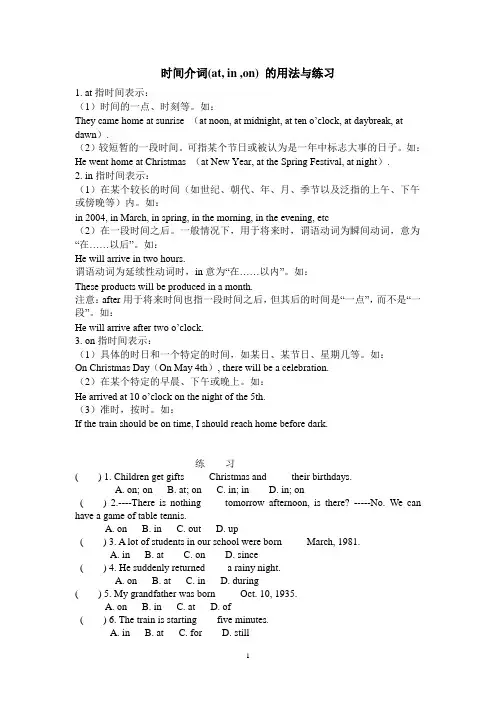
时间介词(at, in ,on) 的用法与练习1. at指时间表示:(1)时间的一点、时刻等。
如:They came home at sunrise (at noon, at midnight, at ten o’clock, at daybreak, at dawn).(2)较短暂的一段时间。
可指某个节日或被认为是一年中标志大事的日子。
如:He went home at Christmas (at New Year, at the Spring Festival, at night).2. in指时间表示:(1)在某个较长的时间(如世纪、朝代、年、月、季节以及泛指的上午、下午或傍晚等)内。
如:in 2004, in March, in spring, in the morning, in the evening, etc(2)在一段时间之后。
一般情况下,用于将来时,谓语动词为瞬间动词,意为“在……以后”。
如:He will arrive in two hours.谓语动词为延续性动词时,in意为“在……以内”。
如:These products will be produced in a month.注意:after用于将来时间也指一段时间之后,但其后的时间是“一点”,而不是“一段”。
如:He will arrive after two o’clock.3. on指时间表示:(1)具体的时日和一个特定的时间,如某日、某节日、星期几等。
如:On Christmas Day(On May 4th), there will be a celebration.(2)在某个特定的早晨、下午或晚上。
如:He arrived at 10 o’clock on the night of the 5th.(3)准时,按时。
如:If the train should be on time, I should reach home before dark.练习( ) 1. Children get gifts ____ Christmas and ____ their birthdays.A. on; onB. at; onC. in; inD. in; on( ) 2.----There is nothing ____tomorrow afternoon, is there? -----No. We can have a game of table tennis.A. onB. inC. outD. up( ) 3. A lot of students in our school were born ____ March, 1981.A. inB. atC. onD. since( ) 4. He suddenly returned____ a rainy night.A. onB. atC. inD. during( ) 5. My grandfather was born ____ Oct. 10, 1935.A. onB. inC. atD. of( ) 6. The train is starting ___ five minutes.A. inB. atC. forD. still( ) 7. Mike does his exercises ____ seven _____ the evening.A. on; toB. at; inC. by; ofD. at; on( ) 8. Children wake up very early ____ the morning of Christmas Day.A. inB. onC. forD. at( ) 9 ____ a cold winter morning, I met her in the street.A. InB. OnC. AtD. For( ) 10 It happened to be very cold____ the morning of our sports meeting.A. atB. onC. withD. of( ) 11. Why did you get up so early ___ this morning.A. onB. /C. atD. in( ) 12. He went to Shanghai___ September 3, 1991 and came back___ a cold morning last year.A. in; onB. on; inC. on; onD. in; in( ) 13. Lucy was born____ the night of May 12, 1984. . ...A. onB. inC. atD. to( ) 14. Mrs Brown came to China ____ 1996.A.onB. ofC. to,D. in( ) 15 ___ the morning of November 20, 1915, the workers came to Chicago to show their mourning of Joe Hill.A. OnB. InC. OnD. At( ) 16. Ann moved ___ Hangzhou ___ September, 1992.A. /; inB. to; inC. to; on D, in; in( ) 17. They started off ___ an autumn afternoon.A. duringB. atC. inD. on( ) 18. He often goes ____ school ____ six thirty ____ the morning.A. for; to; inB. to; at; inC. to; for; at D, for; at; to( ) 19. He arrived ___ Shanghai ___ 9: 30 ___ March 5.A. at; in; atB. to; on; atC. in; on; atD. in; at; on( ) 20.The English teacher told me to get there____ half past ten.A: in B. at C. on D. of答案:B A A A A A B B B B BC AD B A D B D B。
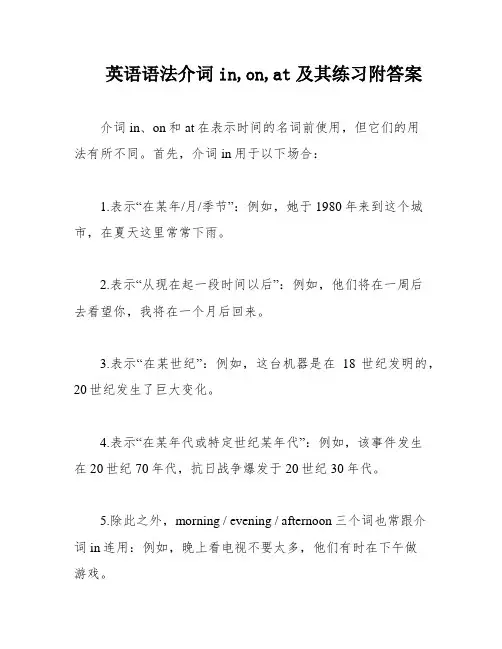
英语语法介词in,on,at及其练习附答案介词in、on和at在表示时间的名词前使用,但它们的用法有所不同。
首先,介词in用于以下场合:1.表示“在某年/月/季节”:例如,她于1980年来到这个城市,在夏天这里常常下雨。
2.表示“从现在起一段时间以后”:例如,他们将在一周后去看望你,我将在一个月后回来。
3.表示“在某世纪”:例如,这台机器是在18世纪发明的,20世纪发生了巨大变化。
4.表示“在某年代或特定世纪某年代”:例如,该事件发生在20世纪70年代,抗日战争爆发于20世纪30年代。
5.除此之外,morning / evening / afternoon三个词也常跟介词in连用:例如,晚上看电视不要太多,他们有时在下午做游戏。
其次,介词on用于以下场合:1.表示“在具体的某一天”或“(在具体的某一天的)早上、中午、晚上”等:例如,杰克生于1982年5月10日,他们是在一个雨天的早上离开的。
He returned to the United States one summer afternoon。
To indicate a specific day of the week or time of day。
the n "on" is used。
For example: We do not attend school on Saturdays and Sundays。
What time do you wake up on weekdays。
I heard this story on Saturday morning。
To indicate a specific holiday。
the n "on" is used。
For example: We usually eat mooncakes on theMid-Autumn Festival。
Mr。
Hu received a card on Teachers' Day.To indicate a specific time of day (i.e。
时间介词(at, in ,on) 的用法与练习1. at指时间表示:(1)时间的一点、时刻等。
如:They came home at sunrise (at noon, at midnight, at ten o’clock, at daybreak, at dawn).(2)较短暂的一段时间。
可指某个节日或被认为是一年中标志大事的日子。
如:He went home at Christmas (at New Year, at the Spring Festival, at night).2. in指时间表示:(1)在某个较长的时间(如世纪、朝代、年、月、季节以及泛指的上午、下午或傍晚等)内。
如:in 2004, in March, in spring, in the morning, in the evening, etc(2)在一段时间之后。
一般情况下,用于将来时,谓语动词为瞬间动词,意为“在……以后”。
如:He will arrive in two hours.谓语动词为延续性动词时,in意为“在……以内”。
如:These products will be produced in a month.注意:after用于将来时间也指一段时间之后,但其后的时间是“一点”,而不是“一段”。
如:He will arrive after two o’clock.3. on指时间表示:(1)具体的时日和一个特定的时间,如某日、某节日、星期几等。
如:On Christmas Day(On May 4th), there will be a celebration.(2)在某个特定的早晨、下午或晚上。
如:He arrived at 10 o’clock on the night of the 5th.(3)准时,按时。
如:If the train should be on time, I should reach home before dark.练习( ) 1. Children get gifts ____ Christmas and ____ their birthdays.A. on; onB. at; onC. in; inD. in; on( ) 2.----There is nothing ____tomorrow afternoon, is there? -----No. We can have a game of table tennis.A. onB. inC. outD. up( ) 3. A lot of students in our school were born ____ March, 1981.A. inB. atC. onD. since( ) 4. He suddenly returned____ a rainy night.A. onB. atC. inD. during( ) 5. My grandfather was born ____ Oct. 10, 1935.A. onB. inC. atD. of( ) 6. The train is starting ___ five minutes.A. inB. atC. forD. still( ) 7. Mike does his exercises ____ seven _____ the evening.A. on; toB. at; inC. by; ofD. at; on( ) 8. Children wake up very early ____ the morning of Christmas Day.A. inB. onC. forD. at( ) 9 ____ a cold winter morning, I met her in the street.A. InB. OnC. AtD. For( ) 10 It happened to be very cold____ the morning of our sports meeting.A. atB. onC. withD. of( ) 11. Why did you get up so early ___ this morning.A. onB. /C. atD. in( ) 12. He went to Shanghai___ September 3, 1991 and came back___ a cold morning last year.A. in; onB. on; inC. on; onD. in; in( ) 13. Lucy was born____ the night of May 12, 1984. . ...A. onB. inC. atD. to( ) 14. Mrs Brown came to China ____ 1996.A.onB. ofC. to,D. in( ) 15 ___ the morning of November 20, 1915, the workers came to Chicago to show their mourning of Joe Hill.A. OnB. InC. OnD. At( ) 16. Ann moved ___ Hangzhou ___ September, 1992.A. /; inB. to; inC. to; on D, in; in( ) 17. They started off ___ an autumn afternoon.A. duringB. atC. inD. on( ) 18. He often goes ____ school ____ six thirty ____ the morning.A. for; to; inB. to; at; inC. to; for; at D, for; at; to( ) 19. He arrived ___ Shanghai ___ 9: 30 ___ March 5.A. at; in; atB. to; on; atC. in; on; atD. in; at; on( ) 20.The English teacher told me to get there____ half past ten.A: in B. at C. on D. of答案:B A A A A A B B B B BC AD B A D B D B。
介词in,at,on的用法一、介词in,at,on的基本用法介词是英语中非常重要且常用的词汇,在句子中起到连接作用,表示人或物在空间或时间上的位置关系。
其中,in、at和on是三个最常见的介词。
它们在使用时有着不同的规则和搭配方式。
1. in 的用法介词in表示“在……里面”、“在……之内”,常见于以下情境:a) 表示地点:例如,“in the room”(在房间里)、“in the garden”(在花园中)等。
b) 表示国家、城市和地区:例如,“in China” (在中国)、“in New York”(在纽约)等。
c) 表示特定位置:例如,“in front of the house”(在房子前面)、“in the corner”(在角落里)等。
d) 表示一段时间的具体部分:例如,“in the morning”(早上)、“in the evening”(傍晚)等。
2. at 的用法介词at表示“在……处”,常见于以下情境:a) 表示具体位置:例如,“at home”(在家)、“at school”(在学校)等。
b) 表示特定地点或建筑物:例如,“at the airport”(在机场)、“at the cinema” (在电影院)等。
c) 表示时间点:例如,“at 3 o'clock” (在3点钟)、“at noon”(在中午)等。
d) 表示某种状态或情感:例如,“good at swimming” (擅长游泳)、“angry at him”(对他生气)等。
3. on 的用法介词on表示“在……上方”,常见于以下情境:a) 表示具体位置:例如,“on the table”(在桌子上)、“on the bed”(在床上)等。
b) 表示交通工具:例如,“on the bus” (在公交车上)、“on the train”(乘坐火车)等。
c) 表示日期或特定的一天:例如,“on Monday”(星期一)、“on New Year's Day”(元旦)等。
英语中表示时间、地点的介词,最常用的是介词in、on、at。
in后多是月份、季节、年等;on搭配星期几或具体日期;at后常跟具体的时间点或节日期间。
in的用法1、在表示时间上,in表示一个较长的时间段,从什么时候开始到什么时候到结束的一段时间。
比如上午,下午,晚上,年,月,日,季节等。
2、表示地点,场所,意思是在.......里边,在........中。
3、表示语言,用,材料。
比如用日语,英语,汉语等。
4、表示状态,一般指穿戴。
比如:穿着什么样的衣服,戴着什么样的帽子等。
例句:We watch TV in the evening.我们晚上看电视。
He went to Japan in 1946.他于 1946 去了日本。
on的用法1、on表示时间:比如在今天的上午,或者下午等,用于星期,日期等前面。
2、on表示地点:在.....旁,靠近,接近的意思。
比如:在我左边或者右面,在临街,在临桌等。
3、表示状态:意思是从事....... 处于......... 在......情况中等。
4、表示在物体的上面。
意思为在......之上。
比如在盒子上。
例句:He left here on the fifth of May.他于 5 月 5 日离开这儿。
at的用法1、表示时间:指某一个时间点,比如。
你每天几点起床,几点吃饭等。
2、在某个特定的时间,时机,时候,季节等用at.3、在........岁。
也用at.比如,在我8岁的时候,10岁的时候等4、在.......方面。
用at。
比如。
在工作方面,生活方面等。
例句:I get up at six in the morning.我早上六点钟起床。
He got married at the age of 25.他 25 岁结婚。
介词inonat的用法题型一、介词 "in" 的用法介词 "in" 是英语中使用频率很高的一个介词,它有多种用法和含义,以下将对其常见的用法进行详细讲解。
1. 表示位置或地点首先,"in" 可以表示一个物体或人所处的具体位置或地点。
例如:- There is a cat sitting in the tree.(有只猫坐在树上。
)- The library is in front of the school.(图书馆在学校前面。
)2. 表示时间或日期另外,"in" 也可以表示特定的时间或日期。
例如:- My birthday is in August. (我的生日是在八月。
)- We have a meeting in ten minutes.(十分钟后我们有个会议。
)3. 表示成员或附属于某个整体此外,"in" 还可以表示某事物作为一个成员或附属于某个整体存在。
例如:- Martin plays guitar in a band. (马丁在乐队里弹吉他。
)- She works as a reporter in a newspaper company.(她在一家报社工作。
)4. 表示方式方式、手段、材料等接下来,"in" 还可以表示某件事情完成的方式、手段、材料等等。
例如:- Lisa paints in watercolor.(莉萨用水彩画画。
)- They expressed their opinions in a civilized manner.(他们以文明的方式表达了观点。
)5. 表示状态或情感此外,"in" 在表达状态或情感时也很常见。
例如:- My grandmother is in good health.(我奶奶身体很好。
)- He is always in a bad mood in the morning.(他早上总是情绪不好。
时间介词(at, in ,on) 的用法与练习1. at指时间表示:(1)时间的一点、时刻等。
如:They came home at sunrise (at noon, at midnight, at ten o’clock, at daybreak, at dawn).(2)较短暂的一段时间。
可指某个节日或被认为是一年中标志大事的日子。
如:He went home at Christmas (at New Year, at the Spring Festival, at night).2. in指时间表示:(1)在某个较长的时间(如世纪、朝代、年、月、季节以及泛指的上午、下午或傍晚等)内。
如:in 2004, in March, in spring, in the morning, in the evening, etc(2)在一段时间之后。
一般情况下,用于将来时,谓语动词为瞬间动词,意为“在……以后”。
如:He will arrive in two hours.谓语动词为延续性动词时,in意为“在……以内”。
如:These products will be produced in a month.注意:after用于将来时间也指一段时间之后,但其后的时间是“一点”,而不是“一段”。
如:He will arrive after two o’clock.3. on指时间表示:(1)具体的时日和一个特定的时间,如某日、某节日、星期几等。
如:On Christmas Day(On May 4th), there will be a celebration.(2)在某个特定的早晨、下午或晚上。
如:He arrived at 10 o’clock on the night of the 5th.(3)准时,按时。
如:If the train should be on time, I should reach home before dark.练习( ) 1. Children get gifts ____ Christmas and ____ their birthdays.A. on; onB. at; onC. in; inD. in; on( ) 2.----There is nothing ____tomorrow afternoon, is there? -----No. We can have a game of table tennis.A. onB. inC. outD. up( ) 3. A lot of students in our school were born____March, 1981.A. inB. atC. onD. since( ) 4. He suddenly returned____ a rainy night.A. onB. atC. inD. during( ) 5. My grandfather was born____Oct. 10, 1935.A. onB. inC. atD. of( ) 6. The train is starting___five minutes.A. inB. atC. forD.still( ) 7. Mike does his exercises ____ seven _____ the evening.A. on; toB. at; inC. by; ofD. at; on( ) 8. Children wake up very early____the morning of Christmas Day.A. inB. onC. forD. at( ) 9 ____ a cold winter morning, I met her in the stfeet.A. InB. OnC. AtD. For( ) 10 It happened to be very cold____ the morning of our sports meeting.A. atB. onC. withD. of( ) 11. Why did you get up so early ___ this morning.A. onB. /C. atD. in( ) 12. He went to Shanghai___ September 3, 1991 and came back___ a cold morning last year.A. in; onB. on; inC. on; onD. in; ia( ) 13. Lucy was born____ the night of May 12, 1984. . ...A. onB. inC. atD. to( ) 14. Mrs Brown came to China ____ 1996.A.onB. ofC. to,D. in( ) 15 ___ the morning of November 20, 1915, the workers came to Chicago to show their mourning of Joe Hill.A. OnB. InC. OnD. At( ) 16. Ann moved___Hangzhou___September, 1992.A. /; inB. to; inC. to; on D, in; in( ) 17. They started off___an autumn afternoon.A. duringB. atC. inD. on( ) 18. He often goes ____ school ____ six thirty ____ the morning.A. for; to; inB. to; at; inC. to; for; at D, for; at; to( ) 19. He arrived ___ Shanghai ___ 9: 30 ___ March 5. A. at; in; at B. to; on; at C. in; on; at D. in; at; on( ) 20.The English teacher told me to get there____ half past ten.A: in B. at C. on D. of答案:B A A A A A B B B B B C A D B A D B D B。
时间介词(at, in ,on) 的用法与练习1. at指时间表示:(1)时间的一点、时刻等。
如:They came home at sunrise (at noon, at midnight, at ten o’clock, at daybreak, at dawn).(2)较短暂的一段时间。
可指某个节日或被认为是一年中标志大事的日子。
如:He went home at Christmas (at New Year, at the Spring Festival, at night).2. in指时间表示:(1)在某个较长的时间(如世纪、朝代、年、月、季节以及泛指的上午、下午或傍晚等)内。
如:in 2004, in March, in spring, in the morning, in the evening, etc(2)在一段时间之后。
一般情况下,用于将来时,谓语动词为瞬间动词,意为“在……以后”。
如:He will arrive in two hours.谓语动词为延续性动词时,in意为“在……以内”。
如:These products will be produced in a month.注意:after用于将来时间也指一段时间之后,但其后的时间是“一点”,而不是“一段”。
如:He will arrive after two o’clock.3. on指时间表示:(1)具体的时日和一个特定的时间,如某日、某节日、星期几等。
如:On Christmas Day(On May 4th), there will be a celebration.(2)在某个特定的早晨、下午或晚上。
如:He arrived at 10 o’cloc k on the night of the 5th.(3)准时,按时。
如:If the train should be on time, I should reach home before dark.练习( ) 1. Children get gifts ____ Christmas and ____ their birthdays.A. on; onB. at; onC. in; inD. in; on( ) 2.----There is nothing ____tomorrow afternoon, is there?-----No. We can have a game of table tennis.A. onB. inC. outD. up( ) 3. A lot of students in our school were born ____ March, 1981.A. inB. atC. onD. since( ) 4. He suddenly returned____ a rainy night.A. onB. atC. inD. during( ) 5. My grandfather was born ____ Oct. 10, 1935.A. onB. inC. atD. of( ) 6. The train is starting ___ five minutes.A. inB. atC. forD. still( ) 7. Mike does his exercises ____ seven _____ the evening.A. on; toB. at; inC. by; ofD. at; on( ) 8. Children wake up very early ____ the morning of Christmas Day.A. inB. onC. forD. at( ) 9 ____ a cold winter morning, I met her in the street.A. InB. OnC. AtD. For( ) 10 It happened to be very cold____ the morning of our sports meeting.A. atB. onC. withD. of( ) 11. Why did you get up so early ___ this morning.A. onB. /C. atD. in( ) 12. He went to Shanghai___ September 3, 1991 and came back___ a cold morning last year.A. in; onB. on; inC. on; onD. in; in( ) 13. Lucy was born____ the night of May 12, 1984. . ...A. onB. inC. atD. to( ) 14. Mrs Brown came to China ____ 1996.A.onB. ofC. to,D. in( ) 15 ___ the morning of November 20, 1915, the workers came to Chicago to show their mourning of Joe Hill.A. OnB. InC. OnD. At( ) 16. Ann moved ___ Hangzhou ___ September, 1992.A. /; inB. to; inC. to; on D, in; in( ) 17. They started off ___ an autumn afternoon.A. duringB. atC. inD. on( ) 18. He often goes ____ school ____ six thirty ____ the morning.A. for; to; inB. to; at; inC. to; for; at D, for; at; to( ) 19. He arrived ___ Shanghai ___ 9: 30 ___ March 5.A. at; in; atB. to; on; atC. in; on; atD. in; at; on( ) 20.The English teacher told me to get there____ half past ten.A: in B. at C. on D. of答案:B A A A A A B B B B BC AD B A D B D B。